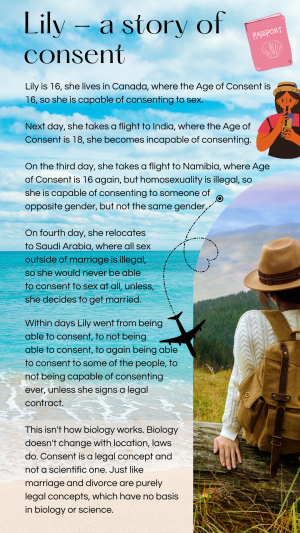Consent

Consent is the willingness and agreement to engage in an act or proposal made by another party, which must be given voluntarily, without force or coercion. Informed Consent must be given by a competent person, who is not subject to deception. Competence includes the mental capacity to understand the act in question.
Consent can be express (person A says "yes" to person B's proposal) or implied (i.e. through behavioral cues or other modes of communication).[1][2][3][4]
Limitations of consent
Consent can be withdrawn at any time and under certain conditions cannot be given due to incapacity. For example, a person who is severely intoxicated, under the influence of drugs, or asleep cannot give valid consent because they temporarily lack the capacity.[5] Mental capacity refers to a person's ability to understand information, make rational decisions, and express themselves.[6]
Most countries have laws stipulating that people under a certain age cannot sign legal contracts, and in the United States such contracts are voidable in court. Countries commonly legislate that people under a certain age cannot consent to sexual relationships, subject to a variety of exceptions. "Romeo and Juliet" (close-in-age) exemptions allow young people within a set number of years to give consent to sex with one another. The age of consent and exceptions vary widely from country to country and within countries, reflecting the arbitrary nature of Age of consent laws[7] and the failure of lawmakers to agree on a common standard of physiological and neurological development (to the extent that it even exists). The same person may be legally capable of consenting to sex in one jurisdiction but not in another regardless of their individual capacity, mental competence, and willingness based solely on physical age.[8]
The Seventh Circuit Court of Appeals boasts three different ages of consent — Indiana: 16, Illinois: 17, and Wisconsin: 18. I defy anyone to tell me that teens in Indiana are more mature than those in Wisconsin. Maybe Indiana legislators simply don’t believe in the science of adolescent development?[7]
Many states also make exceptions to the age of consent law for married partners who may be under the local age of consent or married, with permission of their parents, to an older partner.[9]
History and modern interpretation
The first laws governing consent and age come from English law in 1275 where it was a misdemeanor to "ravish" a maiden below the marriageable age of 12 with or without consent.[8] The modern descendants of these laws violate the fundamental principle of bodily autonomy: That a person has fundamental control and ownership of their body. Age of consent laws are primarily used to pursue cases where both partners willingly agreed to sex or where the case is marginal. The cases can be pursued by district attorneys without cooperation of the minor and even over the protests of the person being 'protected' by the law. Cases of non-consensual sex could be pursued under rape and assault laws, but those laws aren't relevant to sex between willing people.[9]
In the United States (at the time of writing) the youngest age of sexual consent is 16 years old in 33 states, 17 years in 6 states and 18 years in the rest, placing the nation among the most puritanical, along with the UK.
In one example, that is correct at the time of writing:
- A teen who lived in Washington State could legally consent to sex with an older partner of 22 for example. But if they traveled to California the next day, the same person could not legally consent to sex with another 16-year-old, because there is no "Romeo and Juliet" exemption under Californian law, and the age of consent is 18. Legally, both teens would be committing sexual assault on one another, while in turn, both being assaulted!
"Informed Consent"

Informed Consent is a clinical term relating to medical and research situations. Patients and research participants have the right to ask questions, be given relevant information that a reasonable person would want to have to make an informed decision. The information should be in language that is understandable to them. They should be made aware that participation or treatment is voluntary.[10] A provider seeking informed consent must judge the patient's decision-making capacity and ability to understand relevant treatment information. Informed consent can be given even when an inducement such as money is involved.[11] "Broad consent" refers to how consent is uses colloquially outside clinical situations.
"Simple Consent"
Similar to assent, discussed in the Vox[7] article, is the concept of Simple Consent (when a person says yes, or implies their consent). Simple consent does not take account of knowledge or mental capacity, and is an important construct within the psychological sciences, particularly in relation to the psychological outcomes of Minor-adult sex. This is because when sex to which a minor gives simple consent (regardless of legal ability to consent) is deemed CSA a priori, the construct of CSA fails key scientific tests with respect to its concept validity. In other words, by confusing simply consensual acts with rape and assault, the concept of sex between a minor and adult as "abusive" becomes meaningless as a scientific paradigm, and thus only undermines the stigma against non-consensual acts.
Teaching consent
In the 10s and 20s, the subject of Consent or Consent Awareness education has become a touchstone topic of cultural discussions. While these courses often insist upon the importance of what they call Affirmative Consent, their deployment in early and middle years schooling is often seen by American conservatives as evidence of grooming and indoctrination by left-wing educators. In one case, a person claiming to be a sex educator made the argument that teaching consent puts power in the hands of minors, and that this is a good thing as Minor-adult sex is not inherently harmful. Conservative uproar then ensued, with respondents suggesting that "teaching children to consent" will lead to cultural degeneracy.
Gallery
-
US reaction to AoC law (humor)
-
Consent examples (info)
-
AoC is a western concept (info)
See also
- Legal information
- Age of Consent - Some information not covered on other Encyclopedias.
- Statutory rape - Where laws arbitrarily deem underage sex to be "rape".
- Minor - A concept related to, but not fundamentally tied to ages of consent.
- Debate Guide: Cognitive ability = consent
- Debate Guide: Problems with the Age of Consent
- Romeo and Juliet
In-house essays
- The Truth Behind The Age Of Consent Laws - Dissident.
- Peru Lowers Its Age Of Consent--My Analysis - Dissident.
- A Critical Look At the Age of Consent Laws - Strider@ThePub.
References
- ↑ Cornell Law: Consent
- ↑ Merriam Webster (Dictionary): Consent
- ↑ Wilson Law: Express and Implied consent
- ↑ Legal Dictionary: Implied Consent
- ↑ Cornell Law: Capacity
- ↑ Cornell Law: Mental Capacity
- ↑ 7.0 7.1 7.2 Vox: Age of consent and Teen Psychology. Please note that while some points made in this article are commonsense, it relies upon outdated and misguided interpretations of brain imaging data in making claims about the cognitive capacities of young people.
- ↑ 8.0 8.1 chnm.gmu.edu: Arbitrary sex laws
- ↑ 9.0 9.1 shouselaw.com: Example of parental consent exemption
- ↑ hhs.gov: Informed Consent
- ↑ ama-assn.org: Ethics: Informed Consent

